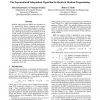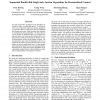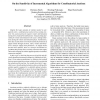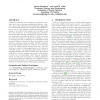150
click to vote
AAAI
2012
13 years 4 months ago
2012
The complexity of the winner determination problem has been studied for almost all common voting rules. A notable exception, possibly caused by some confusion regarding its exact ...
132
click to vote
INFOCOM
2012
IEEE
13 years 4 months ago
2012
IEEE
—In this paper, we tackle the spectrum allocation problem in cognitive radio (CR) networks with time-frequency flexibility consideration using combinatorial auction. Different f...
137
click to vote
AI
2002
Springer
15 years 1 months ago
2002
Springer
Combinatorial auctions, that is, auctions where bidders can bid on combinations of items, tend to lead to more efficient allocations than traditional auction mechanisms in multi-i...
112
click to vote
IJCAI
2001
15 years 3 months ago
2001
Boolean linear programs (BLPs) are ubiquitous in AI. Satisfiability testing, planning with resource constraints, and winner determination in combinatorial auctions are all example...
115
click to vote
IJCAI
2007
15 years 3 months ago
2007
We study auction-like algorithms for the distributed allocation of tasks to cooperating agents. To reduce the team cost of sequential single-item auction algorithms, we generalize...
122
click to vote
WECWIS
2002
IEEE
15 years 7 months ago
2002
IEEE
Despite the large amounts of runtime needed to adequately solve a combinatorial auction (CA), existing iterative CA auction protocols require winner determination during every rou...
125
click to vote
HUMAN
2003
Springer
15 years 7 months ago
2003
Springer
Auctions have become popular in conducting trade negotiations on the Internet. The design of new auction formats and other negotiation protocols has become an important topic for r...
120
click to vote
CAEPIA
2003
Springer
15 years 7 months ago
2003
Springer
Abstract. Negotiation events in industrial procurement involving multiple, highly customisable goods pose serious challenges to buyers when trying to determine the best set of prov...
118
click to vote
IAT
2006
IEEE
15 years 8 months ago
2006
IEEE
Combinatorial Auctions (CAs), where users bid on combination of items, have emerged as a useful tool for resource allocation in distributed systems. However, two main difficulties...
127
click to vote
ATAL
2007
Springer
15 years 8 months ago
2007
Springer
Distributed allocation and multiagent coordination problems can be solved through combinatorial auctions. However, most of the existing winner determination algorithms for combina...




